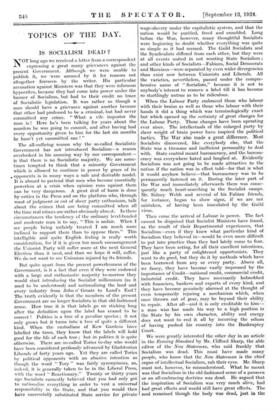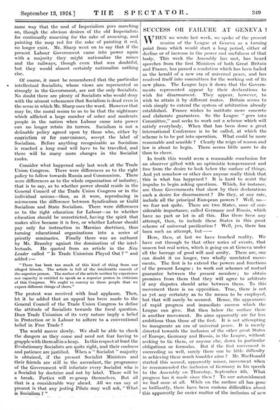TOPICS OF THE DAY.
IS SOCIALISM DEAD ?
NOT long ago we received a letter from a correspondent expressing a great many grievances against the present Government. Although we were unable to publish it, we were amused by it for reasons not altogether foreseen by the writer. His particular accusation against Ministers was that they were infamous hypocrites, because they had come into power under the banner of Socialism, but had to their credit no trace of Socialistic legislation. It was rather as though a man should have a grievance against another because that other had professed to be a criminal, but had never committed any crime. " What a vile impostor the man is ! Here he's been talking for years about the murders he was going to commit, and after having had every opportunity given to him for the last six months he hasn't yet committed one ! "
The all-sufficing reason why the so-called Socialistic Government has not introduced Socialism—a reason overlooked in his amusing way by our correspondent— is that there is no Socialistic majority. We are some- times tempted to think that a minority Government which is allowed to continue in power by grace of its opponents is in many ways a safe and desirable model. It is absurd to pretend that men who become essentially powerless at a crisis when opinion runs against them can be very dangerous. A great deal of harm is done by critics in the Press and on the platform who, through want of judgment or out of sheer party enthusiasm, talk about the crimes that are being committed when all the time real crimes are rather obviously absent. In these circumstances the tendency of the ordinary level-headed and moderate man is to say, " This is unfair. When I see people being unfairly treated I am much more inclined to support them than to oppose them." This intelligible and quite English feeling is really worth consideration, for if it is given too much encouragement the Unionist Party will suffer more at the next General Election than it need, and than we hope it will, suffer. We do not want to see Unionism injured by its friends.
But quite apart from the present powerlessness of the Government, is it a fact that even if they were endowed with a large and enthusiastic majority to-morrow they would start introducing the Socialist millennium (as it used to be understood) and nationalizing the land and every industry from John o' Groats to Land's End ? The truth evidently is that the members of the present Government are no longer Socialists in that old-fashioned sense. How true it is that labels go on sticking long after the definition upon the label has ceased to be correct ! Politics is a tree of a peculiar species ; it not only grows but it turns into a tree of quite a different kind. When the custodians of Kew Gardens have labelled the trees, they know that the labels will hold good for the life of each tree ; but in politics it is quite otherwise. There are so-called Tories to-day who would have been considered perilously advanced by Gladstonian Liberals of forty years ago. Yet they are called Tories by political opponents with an abusive intention as though the word " Tory " was fairly synonymous, as, indeed, it is generally taken to be in the Liberal Press, with the word " Reactionary." Twenty or thirty years ago Socialists earnestly believed that you had only got to nationalize everything in order to vest a universal responsibility in the State, and that you would then have successfully substituted State service for private wage-slavery under the capitalistic system, and that the nation would be purified, freed and ennobled. Long before the War, however, many thoughtful Socialists were beginning to doubt whether everything was quite so simple as it had seemed. The Guild Socialists and the Syndicalists differed from each other, but they were at all events united in not wanting State Socialism ; and other kinds of Socialists—Fabians, Social Democrats and Marxians—were separated by even wider divergencies than exist now between Unionists and Liberals. All the varieties, nevertheless, passed under the compre- hensive name of " Socialism," because it is not to anybody's interest to remove a label till it has become so startlingly untrue as to be ridiculous.
When the Labour Party embraced those who labour with their brains as well as those who labour with their hands it did a thing which was terminologically exact but which opened up the certainty of great changes for the Labour Party. Those changes have been operating ever since. The intellectuals of the enlarged party by sheer weight of brain power have inspired the political tactics. The War also made a great difference. Most Socialists discovered, like everybody else, that the State was a tiresome and inefficient personality to deal with. State control meant bureaucracy, and the bureau- cracy was everywhere hated and laughed at. Evidently Socialism was not going to be made attractive to the nation if the nation was in effect told—for that is what it would anyhow believe—that bureaucracy was to be permanently fastened on it. During the later part of the War and immediately afterwards there was conse- quently much heart-searching in the Socialist camps. Mr. Sidney Webb and several of his Fabian friends, for instance, began to show signs, if we are not mistaken, of having been inoculated by the Guild virus.
Then came the arrival of Labour in power. The fact cannot be disguised that Socialist Ministers have found, as the result of their Departmental experiences, that Socialism—even if they knew what particular kind of Socialism they believed in—would be even more difficult to put into practice than they had lately come to fear. They have been acting, for all their excellent intentions, just like a party of enlightened opportunists. They want to do good, but they do it by methods which have been borrowed from any or every party. Above all, we fancy, they have become vastly impressed by- the importance of Credit—national credit, commercial credit, industrial credit. They have necessarily hobnobbed with financiers, bankers and experts of every kind, and they have become genuinely alarmed at the thought of even temporarily injuring a mechanism which, when once thrown out of gear, may be beyond their ability to repair. After all—and it is only creditable to him=: a man who has made his way to a high position in the State by his own character, ability and energy does not want to end it all by incurring the odium of having pushed his country into the Bankruptcy Court.
We were greatly interested the other day in an article in the Evening Standard by Mr. Clifford Sharp, the able editor of the New Statesman, who said frankly that Socialism was dead. This must have made many people, who know that the New Statesman is the chief organ of intellectual Socialism, rub their eyes. Mr. Sharp must not, however, be misunderstood. What he meant was that Socialism in the old-fashioned sense of a panacea or an all-embracing doctrine was dead. He argued that the inspiration of Socialism was very much alive, had had great effects and would still have great effects. The soul remained though the body was dead, just in the same way that the soul of Imperialism goes marching on, though the obvious desires of the old Imperialists for continually, annexing for the sake of annexing, and painting the map red for the sake of painting it red, no longer exist. Mr. Sharp went on to say that if the present Labour Government came into power again with a majority they might nationalize the mines and the railways, though even that was doubtful, but they would almost certainly nationalize nothing else.
Of course, it must be remembered that the particular • intellectual Socialists, whose views are represented so strongly in the Government, are not the only Socialists. No doubt there are plenty of Socialists who would deny with the utmost vehemence that Socialism is dead even in the sense in which Mr. Sharp uses the word. However that may be, the moral seems to us to be that the nightmare which afflicted a large number of sober and moderate people in the nation when Labour came into power can no longer retain its terrors. Socialism is not a definable policy agreed upon by those who, either by eviction or for convenience, accept the label of Socialism. Before anything recognizable as Socialism is reached a long road will have to be travelled, and there will be many more changes in the Socialist ranks.
Consider what happened only last week at the Trade Union Congress. There were differences as to the right policy to follow towards Russia and Communism. There were differences as to the whole organization of industry, that is to say, as to whether power should reside in the General Council of the Trade Union Congress or in the individual unions—thus, as it were, reproducing in microcosm the difference between Syndicalism or Guild Socialism and State Socialism. There were differences as to the right education for Labour—as to whether education should be unrestricted, having the spirit that makes alive because it is free, or whether Labour should pay only for instruction in Marxian doctrines, thus turning educational organizations into a series of priestly seminaries. Finally there was an outburst by Mr. Bromley against the domination of the intel- lectuals. lie quoted from an article in the New Leader called " Is Trade Unionism Played Out ? " and added :— " There has been too much of this kind of thing from our alleged friends. The article is full of the intolerable conceit of the superior person. The author of the article neither by experience nor capacity is entitled to speak as a superior person in criticism of this Congress. We ought to convey to these people that we expect different things of them."
The protest was received with loud applause. Then, let it be added that an appeal has been made to the General Council of the Trade Union Congress to define the attitude of Socialists towards the fiscal question. Does Trade Unionism of its very nature imply a belief in Protection or is Labour to adhere to a conventional belief in Free Trade ?
The world moves slowly. We shall be able to cheek the dangers as they come and need not fear having to grapple with them all in a heap. In this respect at least the Evolutionary Socialists are quite right, and their coolness and patience are justified. When a " Socialist " majority is obtained, if the present Socialist Ministers and their friends are still in the ascendant, the programme of the Government will infuriate every Socialist who is a Socialist by doctrine and not by label. There will be a break. Parties will re-group themselves. But all that is a considerable way ahead. All we can say at present is that any jesting Pilate may well ask, " What is Socialism ? "



































 Previous page
Previous page